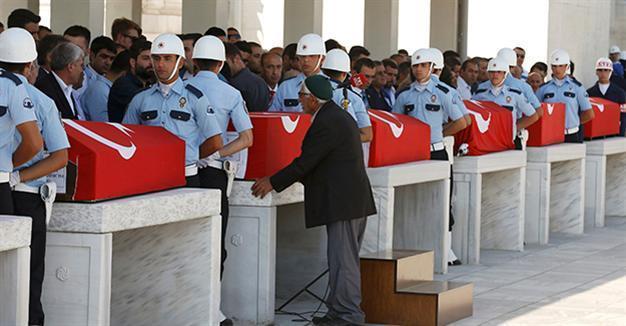Personal stories emerge after military coup attempt in Turkey
ANKARA/ISTANBUL

REUTERS photo
A number of personal stories have begun to emerge following the failed coup attempt in Turkey on July 15, which largely took place in the capital Ankara and the country’s biggest city, Istanbul.Turgut Aslan, a department head of the Security General Directorate’s anti-terror unit, was found shot in the head on July 16 after he had been held hostage by coup plotters. Soldiers had summoned Arslan to the Gendarmerie General Command in Ankara, saying there was an urgent meeting.
Special operations police officers conducted a seven-hour-long operation on the command building, killing 16 coup plotters and capturing another 250 inside. Aslan, who was heavily wounded, was transferred to hospital.
In addition, a number of people protested against the coup on Istanbul’s Bosphorus Bridge in the early hours of the attempt as soldiers blocked traffic. Thousands of people arrived at the bridge after a call from officials to take to the streets. Soldiers then began to open fire on civilians. Erol Olçok, who was the owner of an advertising agency, and his son, Abdullah Olçok, were killed in the fire.
Meanwhile, Istanbul Security General Directorate head Mustafa Çalışkan also went to the bridge in an effort to prevent the coup attempt. Soldiers opened fire on Çalışkan and his two bodyguards. Münir Alkan, one of the bodyguards, was killed in the fire while Çalışkan escaped unharmed. Police officer Mehmet Önay was also wounded in the fire. Soldiers on the bridge subsequently surrendered to security forces at around 6:30 a.m.
However, a group of people with belts and sharp objects ran towards the soldiers on the bridge, reportedly lynching six of them. Some of the wounded soldiers were struck with iron bars while others were dragged on the ground. The crowd tried to throw the lifeless bodies of soldiers from the bridge but faced police intervention. One soldier was allegedly decapitated during the incidents on the bridge.
Many people standing in front of tanks in the streets in Istanbul and Ankara also prevented the coup attempt, as police detained hundreds of soldiers during operations. Tanks rolled over cars parked on the roads to prevent them from driving toward security buildings.
In Istanbul, some also tried to lynch soldiers blocking the road in the city’s Göztepe neighborhood. One captain shot himself in the stomach, while police units later stopped the soldiers from being lynched.
Student soldiers in Istanbul’s Kuleli Military High School were also reportedly taken to streets by their commanders, who claimed it was for a drill. They seized weapons of police officers in the Çengelköy police station. An armed conflict erupted and 10 people were killed. Special operations police officers later raided the school and detained many students.
In addition, soldiers at Istanbul’s Atatürk Airport said in their initial testimonies that they thought they were on a drill but later realized it was a coup when people climbed onto their tanks.
Col. Mustafa Kol, the commander of the coup attempt at the airport, tried to enter the principal room but faced a police officer who drew his gun and said, “I will shoot if you come here.” Kol later withdrew and police detained soldiers with the help of the crowd which had gathered outside the airport.
















